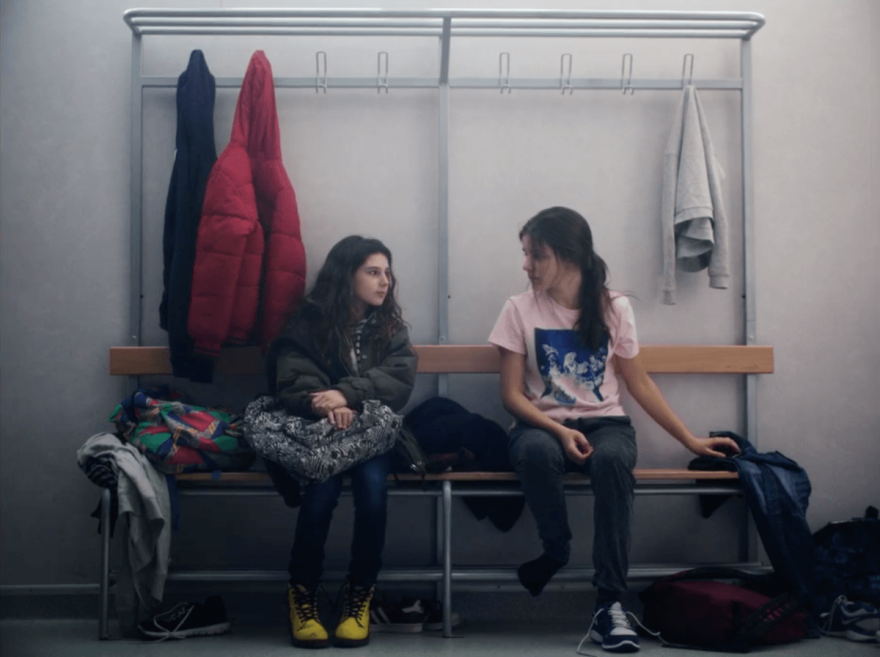Breakfast with Sophiloscope
Interview with Daisy Sadler, director of Sophiloscope
How did you come up with the idea for your film?
The film is drawn from the brutal death of a schoolmate of mine when I was thirteen.
The whole film takes place on the school grounds and shows only the interactions among the students. Why did you choose to “lock up” your characters in this way?
I wanted to show just how much the students were left to their own devices, and underline the adults’ powerlessness in dealing with such a tragic event. All while remaining within the school grounds where you’re meant to be learning math and French. But there is no teacher to teach them, there are no more adults to tell them what to do. So they just walk about all day – in the classroom, the cafeteria, the gym… and they size each other up, they judge each other. Who has the right to cry? Who suffers the most? Who shouldn’t suffer? “Locking them up” in the school allowed me to highlight the dichotomy between their bodies that continue to live, sucked into life’s routines, and their inner world that seems to have stopped.
What drew you to the idea of mourning?
It’s a question of how to live with the certainty of death. Should we live in the full awareness of death, like Zoé does, avoid it like Alice, or laugh about it like Sarah? Beyond the suffering that the death of their friend causes, the film depicts their struggle to face up to this terrible, absurd reality as they also try to confront or forget it.
To me it seemed as though that by focusing the film on Alice rather than on Zoé, you move beyond the question of mourning. What exactly were you aiming for when you made Alice, and not Zoé, your main character?
I wanted to show the different ways that “mourning” resonated.
Zoé lost her best friend. She is tormented by the violence of her passing and the slow realization that she will never see Sophie again. Her mourning is the type we are familiar with and understand. What interests me about Alice is that her pain is more defuse and chaotic. She doesn’t immediately recognize Sophie’s death. She is in pain because Zoé is in pain and she can’t find the words to help her. She suddenly feels out of place. She becomes envious of the attention that Zoé and Sophie now receive. She wishes people would move on to other things; she wishes that the death didn’t exist.
There is a very important, though also very short, scene in the film where Alice finally loses her grip, in her own way. Why did you want to include that scene, and what interested you specifically in that moment?
At the beginning of the film, Alice is trying to find “the right emotion”. She’s worried that she’ll be accused of not crying, of not feeling pain or of feeling too much pain. Her fear of being judged by the others negates her own feelings. Throughout the film, she’s trying to find her place on the scale of suffering, on the scale of mourning. Suddenly, at the end, all of these bubbling emotions erupt in the form of anger. What I wanted was for Alice to do what she was trying not to do: lose control.
Any cinematic coups de cœur in the past year you’d like to tell us about?
I had a baby in 2015 and another in 2016, so right now, I’m watching things like Oui Oui à la ferme [Oui Oui on the Farm] rather than Bergman! I was very impressed by the directing in Joachim Lafosse’s After Love, the beauty of The Red Turtle, the energy and feminism of Divines, and the sense of absurdity in Maren Ade’s film Toni Erdmann. And among the many films I’ve missed this year, I’m eager to see Aquarius, Olivier Babinet’s Swagger, Christian Mungiu’s Graduation…
If you’ve already been to Clermont-Ferrand, could you share with us an anecdote from the festival? If not, what are your expectations for this year?
This is my first time at Clermont-Ferrand, and I am infinitely happy and honored to be able to present my film here. I’m delighted to discover new worlds, new ways of seeing the world thanks to all these films that come from all walks. And to be able to meet, exchange and talk endlessly about my favorite topic: films!
Are you taking part in any other events during the Clermont-Ferrand Short Film Festival (Espressos, conferences, other)?
I will be meeting with audiences at the Cinema Le Rio on Tuesday 7 February from 7pm to 8pm (after the screening of my film, from 5pm to 7pm).
Sophiloscope is being shown in National Competition F6.








